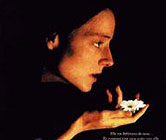|
|
|
|
Nell
|
 |
|
Early on in this film, a dour doctor gets very excited about the opportunity to observe the psychological development of Nell (Jodie Foster), a girl found in the woods who has had virtually no contact with human society. The doctor speculates that we will be able to finally learn what an individual might be if he or she grew up unaffected by gender conditioning or any other form of communal influence. This radical prospect excited me, too. But Nell, sadly, does not deliver on the promise. The story of the unsocialised wild child, and his or her first contact with civilisation, is one that has fascinated filmmakers such as Truffaut (L'Enfant Sauvage, 1970) and Herzog (The Enigma of Kaspar Hauser, 1974). Australia has made a particularly awful contribution to this tradition with Bad Boy Bubby (1994). The reason that some films fail so spectacularly with the theme is perfectly clear. Their makers cannot seriously imagine a person who is completely Other to conventional codes of civilised behaviour. As a result, many stories of this type tend to be maudlin affairs, showing the wild child to be a lost and lonely soul until he or she finds the natural birthright of a home and family. Perhaps only Herzog's film truly respects the enigma of its strange hero right to the end of the tale. Nell sets out boldly towards such unfamiliar terrain with its opening images of a girl tending gently to her mother's corpse – images that recall Tracey Moffat's powerful local short Night Cries: A Rural Tragedy (1990). But virtually from there on, the co-ordinates of this drama become very normative indeed. Nell is studied and nurtured by two professionals, Jerome (Liam Neeson) and Paula (Natasha Richardson). They slowly unravel Nell's private language, and decipher some of the formative images and stories which her fearful mother has planted firmly in her mind. Nell experiences no crisis or ambiguity on the road to discovering that her natural disposition is heterosexuality. And, although the film toys very briefly with the tantalising prospect of a liaison between herself and Jerome, Nell quickly learns to cast her elders in their proper Mum and Dad roles. In fact, in her eagerness to promote socially sanctioned sexual relations, Nell is a veritable Shirley Temple for the New Age. Michael Apted is a British director who seems unable to find his feet in the American filmmaking scene. Often he is brought in to supply a touch of gritty realism to otherwise formulaic genre pieces such as Critical Condition (1986) and Blink (1994). As a result, all his recent work reeks of a certain bad faith, vacillating between Hollywood cliché and equally contrived gestures of arthouse seriousness. Nell is full of trumped-up bits of dramatic business that one cannot believe for an instant, mainly centred on the duo of Jerome and Paula. As Nell dances about in the moonlight, utters her primitive poetry and swims naked, the spotlight turns feebly to Paula: yes, by contrast, she is a repressed career woman, who can only be saved by love. Then, to counterbalance such old-fashioned moralising, Apted turns the tables on Jerome. Is his fascination with Nell just a sign of his inability to deal with real, independent, adult women? The film drops these side events as soon as possible in order to cut to the main attraction: Nell versus a cold, technocratic society. Many wild child stories use the Holy Innocent figure essentially as a foil, a way to mount an accusation against the corruptions of civilisation. Jean-Pierre Gorin's remarkable documentary Poto and Cabengo (1980), for instance, showed how the nasty intrusions of the media (Gorin's own camera included) instantly eroded the private language of an amazing pair of twins. But here, too, Apted uses only the most schematic and most easily manipulable clichés. The psychiatric system is full of heartless Dr Frankensteins who want to imprison Nell, and the local bars are crowded with rednecks whose only desire is to humiliate and abuse her. Paula and Jerome realise that Nell must somehow be returned to the pristine wilderness – at which point this supposedly realist drama becomes a complete and utter fairy tale. Nell is not all bad. Jodie Foster hurls herself into a very challenging part, and convincingly conveys the odd, unreadable movements and secret utterances of an unsocialised being. It is not the actor's fault if the film smothers her fine performance with the ersatz lyricism provided by dutifully beautiful photography and a mushy Mark Isham score. MORE Apted: Coal Miner's Daughter, Continental Divide, Enough, Extreme Measures, Incident at Oglala, 35 Up, The Up Series wild child satire: Human Nature MORE Foster: Anna and the King, Flightplan, Little Man Tate, Panic Room, Sommersby © Adrian Martin February 1995 |
![]()